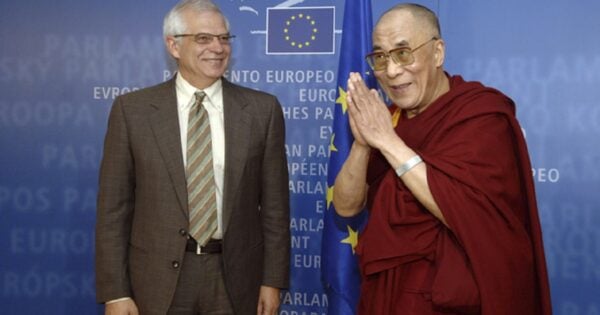
Meeting between His Holiness the Dalai Lama and Mr Borrell when he was President of the European Parliament. (Photo: European Union 2006)
As the European Union’s top diplomat embarks on an official visit to China this week, the International Campaign for Tibet urges him to ensure that the Tibetan issue – and in particular the urgent need for a resolution of the Sino-Tibetan conflict – features high on the agenda of his meetings with Chinese government officials.
The EU High Representative for Foreign Affairs and Security Policy/Vice-President of the European Commission Josep Borrell will visit the People’s Republic of China from Oct. 12 to 14, 2023, where he is due to meet Chinese Foreign Minister Wang Yi for a high-level Strategic Dialogue between China and the EU. Borrell – whose trip previously planned for July had been canceled by China without explanation – will be accompanied by European Commissioner for Energy Kadri Simson.
“Given the strategic importance of Tibet in the wider Asian region, we call on Mr. Borrell to include the unresolved conflict in Tibet into the discussions of the Strategic Dialogue and beyond and to urge China to resume the Sino-Tibetan dialogue process,” said ICT’s EU Policy Director Vincent Metten.
In recent years, the human rights situation in Tibet has gravely deteriorated, particularly after Xi Jinping became President of the People’s Republic of China. Religious and cultural rights, freedom of expression, of assembly and association as well as social and economic rights are extensively curtailed. The survival of an authentic and freely striving Tibetan culture is threatened by aggressive policies of “sinicization” implemented by the Chinese government – as illustrated by the boarding school and pre-school system imposed on around 1 million Tibetan children.
In its conclusions on China adopted on June 30 this year, the European Council reiterated once again the EU’s concerns regarding China’s human rights abuses, including “the situation in Tibet”; Mr. Borrell’s visit represents an important opportunity to follow-up on this and to press China for a course change in this area.
But the EU should also consider Tibet as a strategic issue in its relationship with China. The state of human rights in Tibet is indeed inextricably connected to the peaceful development of South and Southeast Asia. Tibet is of strategic importance because of its location, it being in the border conflict zone between India and China, it being the “water tower” of Asia, and as a place rich in mineral resources (lithium, uranium, copper, iron).
True peace in the region can only be achieved through true peace on the Tibetan Plateau. Therefore, to call for the rights of the Tibetan people is not just a call for rights of a group of individuals. It is advocacy for peace in a globally important region.
Mr. Borrell is no stranger to Tibet, which he visited in July 2006 in his capacity as President of the European Parliament. During a meeting with the Dalai Lama in May 2006, prior to this trip, he had notably reiterated the European Parliament’s commitment to support a peaceful, non-violent solution in Tibet and called on China to grant autonomy to Tibet.

